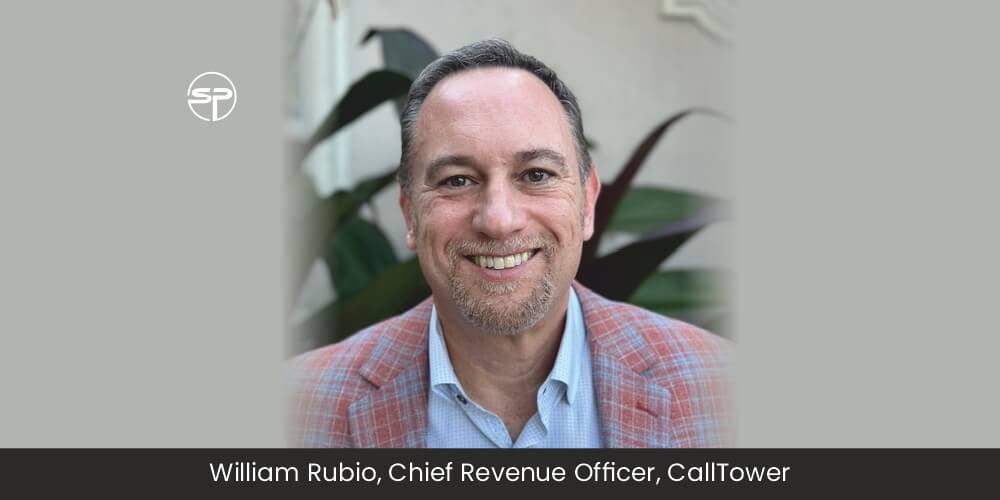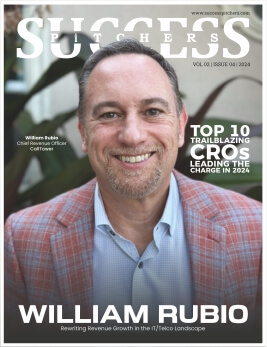William Rubio: Rewriting Revenue Growth in the IT/Telco Landscape
Top 10 Trailblazing CROs Leading the Charge in 2024

In business, the role of a Chief Revenue Officer (CRO) holds pivotal significance. As the primary driver of revenue generation strategies, the CRO orchestrates sales, marketing, and business development efforts to ensure sustainable growth and market competitiveness. Meet William Rubio, the Chief Revenue Officer at CallTower, boasting an impressive 29 years of industry experience. In a realm where job-hopping is common, William defies the norm, having dedicated the last 22 years to just two positions—a rarity in the dynamic IT/telecommunications landscape. His expertise lies in driving remarkable revenue growth across both burgeoning and established markets, leveraging keen insights into industry trends. With a knack for seizing opportunities, forging strategic alliances, and propelling startups into competitive spheres, William is a persuasive negotiator and captivating speaker. His insights have garnered attention from major media outlets like NBC, solidifying his status as a recognized expert in IT/telecommunications.
Originally trained as a capacity planning engineer, William never envisioned a path in sales, marketing, or business development. However, a pivotal recommendation from his second manager led him to embrace sales in 1998—a decision he hasn’t regretted since.
Throughout his career, William has embraced challenges and seized opportunities, from venturing into startups in 2002 and 2013, each imparting invaluable lessons on holistic organizational understanding. His journey is a testament to the power of adaptation and resilience, shaping him into the accomplished leader he is today.
Continuous Reinvention
William believed firmly that no market could be considered truly mature. While certain solutions or products might appear to have reached a level of maturity, in the fast-paced realm of technology, complacency was a dangerous stance to take. He understood that failing to reinvent oneself meant falling behind, often within a remarkably short timeframe.
For William, the essence of success lay in continuously seeking out emerging opportunities within markets or segments. He found motivation in the pursuit of niches, constantly striving to discover new avenues for growth and development. To him, the key lay in the ability to reinvent oneself and to stay ahead of the ever-accelerating pace of change.
In his approach to driving revenue, William adhered to a strategic principle: specialization over diversification. He believed that attempting to be proficient in every aspect of the business was a recipe for mediocrity. Instead, he advocated for the selection of a primary vertical, a distribution channel that would serve as the cornerstone of success. While acknowledging the importance of secondary channels and verticals, William emphasized the necessity of focusing on the primary lead that promised substantial growth, driving bookings and revenue to new heights.
Innovative Learning Leadership
William held a steadfast belief in the indispensable nature of continuous learning to remain competitive in the ever-evolving landscape of his industry. He made it a personal mission to immerse himself in ongoing research, delving into technologies, trends, market data, and other pertinent information to ensure he stayed well-informed. For William, staying abreast of developments meant understanding not only who led the pack but also who lagged behind, discerning the underlying reasons driving each outcome. He understood that to distinguish his company, they needed to stand out in a crowded marketplace. This required a relentless pursuit of innovation and the delivery of advanced solutions to their customers. William was known for his mantra: “If I don’t challenge my product and engineering teams, I am not doing my job.” He firmly believed that it was imperative to push boundaries, fostering an environment where creativity and ingenuity flourished. By consistently striving for innovation, William aimed to ensure that his company remained at the forefront of the industry, offering unparalleled value to its customers.
Startup Realities
In navigating the challenging terrain of startups or restarts, William recognized that capital was a perpetual hurdle, underscoring the importance of judiciously utilizing investments. His primary focus lay in devising strategies for growth and revenue expansion with the lowest possible cost of sale.
William’s approach involved a meticulous consideration of the investment’s timeline for returns. He acknowledged that the gestation period for returns might extend beyond initial expectations. Still, he balanced this awareness with the understanding that agility and adaptability were paramount. He emphasized the need to pivot swiftly, especially if an investment in a particular distribution channel proved less effective than anticipated.
For William, the key to success in a startup venture lay in the ability to shift gears rapidly. He advocated for adopting a mindset that anticipated the need for contingency plans (Plan B) and the readiness to execute them. This nimbleness, according to William, was crucial in responding to market dynamics and seizing opportunities.
While market data and analysts could provide valuable insights, William placed a premium on real-world connections with potential customers and partners. He believed that true validation and understanding of hitting the mark or missing it came from direct interactions within the market. This hands-on approach allowed him to gauge the pulse of his audience, making informed decisions that aligned with the evolving needs and preferences of customers and partners.
Collaborative Growth Strategies
William emphasizes the importance of creating initiatives that engage partners, vendors, suppliers, and customers to drive business growth. He believes that true partnerships are built on mutual understanding and a shared commitment to success.
According to William, successful collaborations occur when all parties recognize the value they bring to the table and understand how working together can provide comprehensive solutions. He stresses the need for businesses to show genuine care for the growth and success of their partners by listening to their needs and understanding their business models.
For William, effective partnerships involve aligning efforts toward common goals and celebrating shared achievements. Drawing from his experiences at CallTower, he emphasizes the importance of recognizing and supporting the unique milestones and initiatives of each partner. He believes that success should be mutually beneficial and achieved through collaboration rather than at the expense of others.
Negotiation Wisdom Unveiled
William, viewing negotiation as a challenging yet crucial aspect of business, believes that negotiators must strive for win/win outcomes. He recognizes the delicate balance between sticking to one’s position and making concessions to achieve objectives.
In his view, clarity about what can be compromised and what remains non-negotiable is paramount in negotiations. Before engaging, having a clear strategy aligned with the end goal is essential. William maintains that negotiations aren’t about winning or losing but rather about achieving objectives while maintaining positive relationships.
After negotiations conclude, William advises a thorough review of the outcomes, focusing on what was gained rather than dwelling on concessions made. This approach, he believes, fosters positive business relationships and sustains a constructive outlook.
Media Network Mastery
William recognizes media networks as valuable platforms for disseminating a company’s value proposition to customers, vendors, and partners. He emphasizes the importance of clarity and swiftness in conveying what the company does, without overt sales pitches, but rather by demonstrating expertise and reliability in the industry.
Drawing from his experiences at CallTower, William notes the significant influx of inquiries following press releases, webinars, or interviews. He attributes this interest to the ability to simplify complex concepts, clarify potential fits, and avoid confusion for the audience. For William, the essence lies in establishing trust during these interactions, as people tend to buy from those they trust.
Principled Partnership Perspectives
William emphasizes the importance of principles to prioritize when establishing and nurturing partnerships with other organizations. He believes that partnerships are integral to business success but acknowledges that they require consistent effort and communication, much like any relationship.
According to William, maintaining alignment between the goals of both organizations is crucial for the longevity of partnerships. Regular meetings, whether quarterly or monthly, serve as opportunities to ensure that everyone remains on the same page. Additionally, he highlights the inevitability of change and the importance of sharing the vision of one’s business with partners to garner their support.
Transparency and honesty are foundational principles for building trust between organizations, according to William. He believes that open communication fosters mutual understanding and strengthens the partnership over time.
Leadership Insights
William’s expertise spans a wide array of areas including start-ups, strategy, managed services, UCaaS, CCaaS, CPaaS, financial models, forecasting, contract negotiations, networks, SDWAN, and security. He values continuous learning and considers it a vital component of running a successful business.
Recognizing the complexities of leadership, William acknowledges the tough decisions leaders often face, balancing the needs of different aspects of the business. He believes that effective leaders challenge their employees, pushing them beyond their comfort zones to achieve new heights. William distinguishes between managers and leaders, noting that true leaders prioritize learning and growth among their teams.
Listening, according to William, is a hallmark of effective leadership. He emphasizes the importance of actively listening to employees and providing guidance when necessary. William understands that allowing employees to fail can be a valuable learning experience, fostering growth and improvement.
Leading by example is another key aspect of effective leadership for William. He stresses the importance of staying connected with employees, understanding their perspectives, and actively involving oneself in problem-solving processes. By empathizing with employees and demonstrating a commitment to their growth and success, William believes that leaders can foster stronger relationships and drive positive outcomes within the organization.










